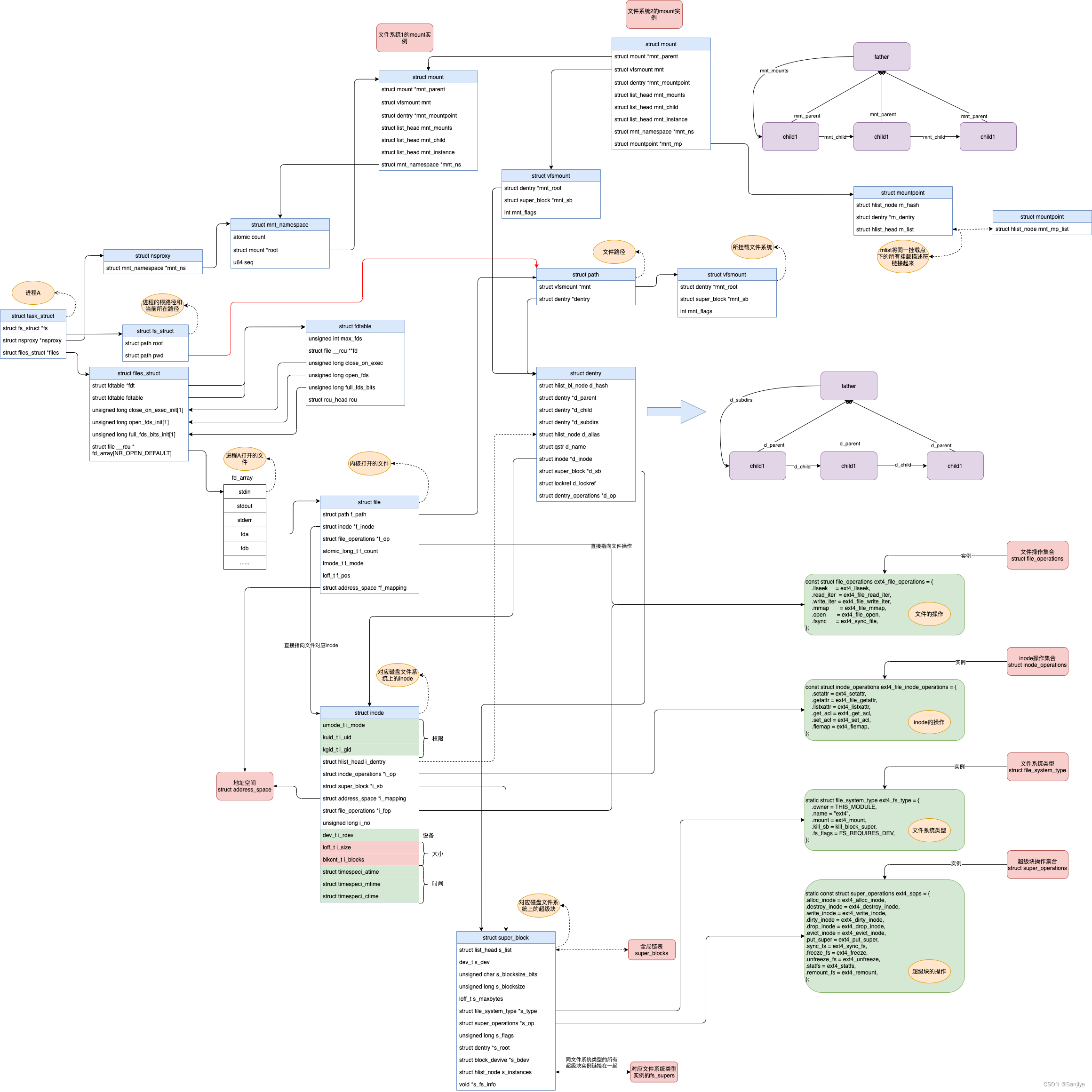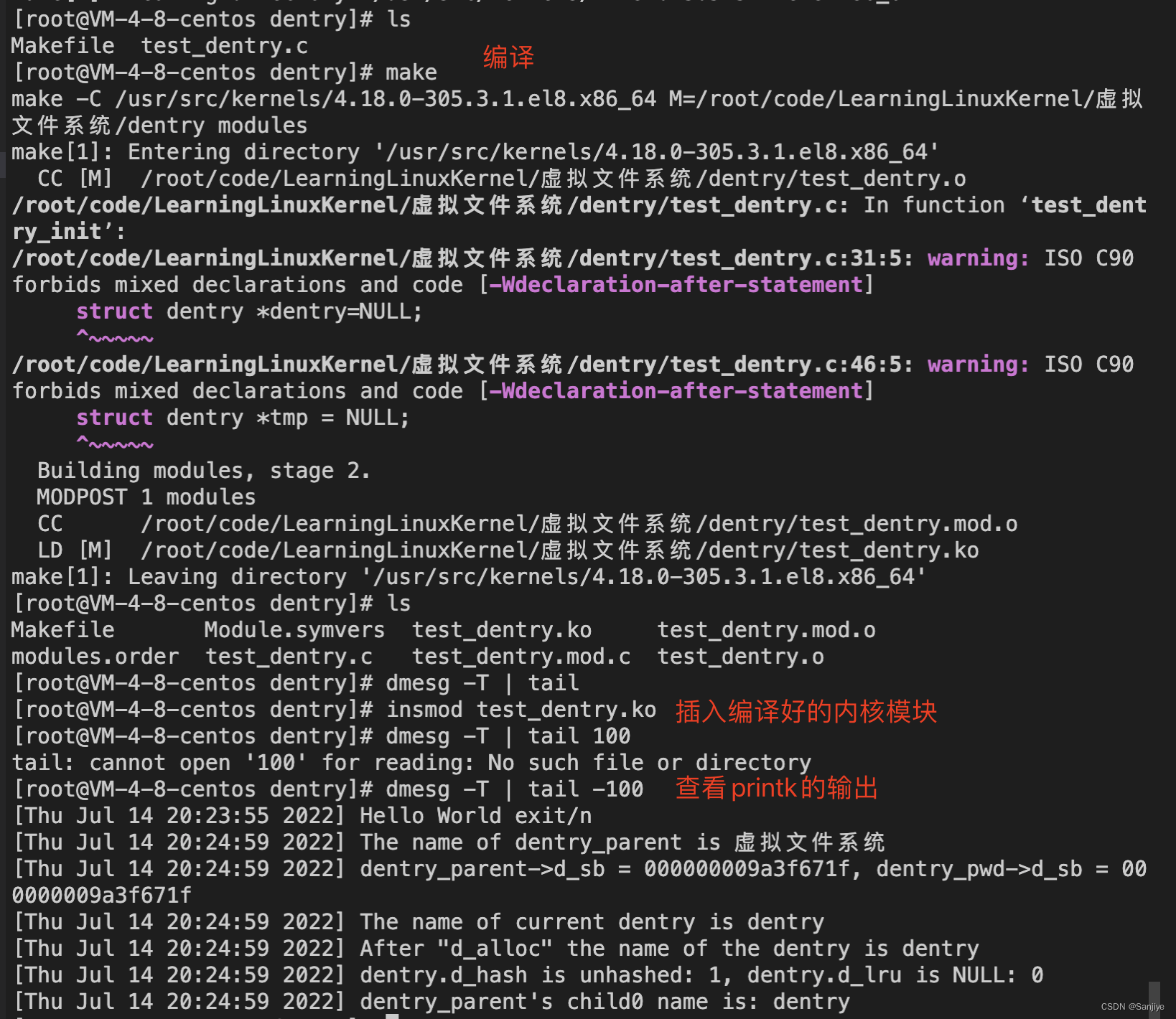导言
很久没有更新csdn博客了,工作两年,学习了不少新东西,很多都没有来的及整理,用过不久很快就忘记了,写到博客中做个记录。
关系图
下图为去年学习文件系统时所画,有参考网上其他博主的资料,也有自己整理,如果有大佬发现不正确的地方欢迎指正,一定及时回复并更正。

关系图使用方式
我们可以根据关系图梳理出各个结构之间的关系,然后在实践环境中进行验证。
#include <linux/init.h>
#include <linux/module.h>
#include <linux/fs.h>
#include <linux/fs_struct.h>
#include <linux/path.h>
#include <linux/sched.h>
#include <linux/dcache.h>
#include <linux/list.h>
//模块许可证声明(必须)
MODULE_LICENSE("GPL");
//模块加载函数(必须)
static int test_dentry_init(void)
{
//获取当前文件的入口目录
struct dentry *dentry_pwd = current->fs->pwd.dentry;
// 获取当前文件的上一级入口目录
struct dentry *dentry_parent = current->fs->pwd.dentry->d_parent;
// 获取当前文件的入口目录名结构体
struct qstr name = current->fs->pwd.dentry->d_name;
//显示父目录名称
printk("The name of dentry_parent is %s\n", dentry_parent->d_name.name);
//判断父子目录项对应super_block是否一样
printk("dentry_parent->d_sb = %p, dentry_pwd->d_sb = %p\n", dentry_parent->d_sb, dentry_pwd->d_sb);
struct dentry *dentry=NULL;
// 分配一个目录项缓存结构体
dentry = d_alloc(dentry_parent, &name);
// 显示当前文件名
printk("The name of current dentry is %s\n", dentry_pwd->d_name.name);
// 显示返回结果文件名
printk("After \"d_alloc\" the name of the dentry is %s\n", dentry->d_name.name);
//判断d_alloc是否有对dentry的d_hash项和d_lru项进行初始化
printk("dentry.d_hash is unhashed: %d, dentry.d_lru is NULL: %d\n", d_unhashed(dentry), dentry->d_lru.next == NULL);
//遍历current dentry的子目录项链表
struct dentry *tmp = NULL;
int i = 0;
if(!spin_trylock(&dentry_parent->d_lockref.lock)){
printk("try lock fail\n");
return 1;
}
list_for_each_entry(tmp, &dentry_parent->d_subdirs, d_child){
/*排除掉负状态的dentry,未添加这个判读的时候
会将很多inode为空的dentry name打印出来数量有
上千个甚至更多个,所以就可以理解为什么dentry
在路径查找的时候会借助dentry_hashtable了*/
if(tmp->d_inode == NULL)
continue;
if(!spin_trylock(&tmp->d_lockref.lock)){
printk("try lock fail\n");
return 1;
}
printk("dentry_parent's child%d name is: %s\n", i++, tmp->d_name.name);
spin_unlock(&tmp->d_lockref.lock);
}
spin_unlock(&dentry_parent->d_lockref.lock);
return 0;
}
//模块卸载函数(必须)
static void test_dentry_exit(void)
{
printk(KERN_INFO "Hello World exit/n");
}
module_init(test_dentry_init);
module_exit(test_dentry_exit);
obj-m += test_dentry.o
#generate the path
CURRENT_PATH:=$(shell pwd)
#the current kernel version number
LINUX_KERNEL:=$(shell uname -r)
#the absolute path
LINUX_KERNEL_PATH:=/usr/src/kernels/$(LINUX_KERNEL)
#complie object
all:
make -C $(LINUX_KERNEL_PATH) M=$(CURRENT_PATH) modules
#clean
clean:
make -C $(LINUX_KERNEL_PATH) M=$(CURRENT_PATH) clean
运行结果
